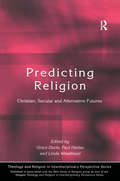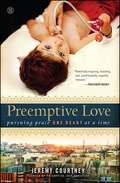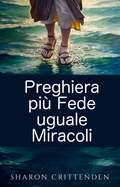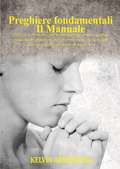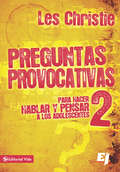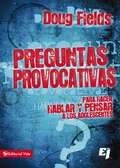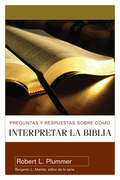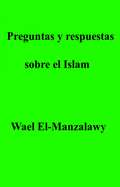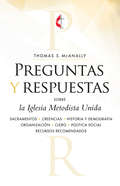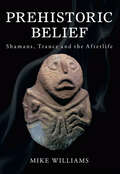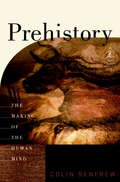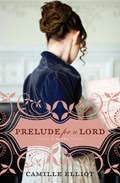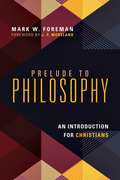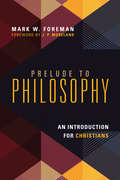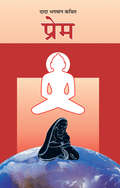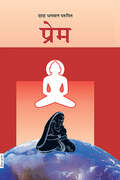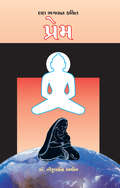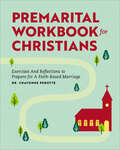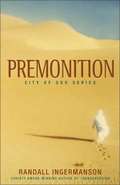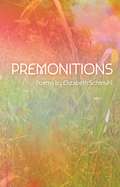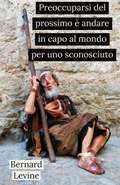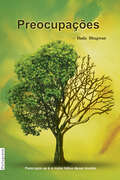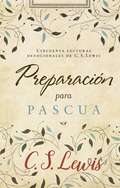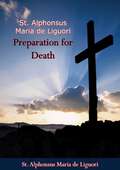- Table View
- List View
Predicting Religion: Christian, Secular and Alternative Futures (Theology and Religion in Interdisciplinary Perspective Series in Association with the BSA Sociology of Religion Study Group)
by Linda Woodhead Grace Davie Paul HeelasReligion in the contemporary west is undergoing rapid change. In Predicting Religion twenty experts in the study of religion present their predictions about the future of religion in the 21st century - predictions based on careful analysis of the contemporary religious scene from traditional forms of Christianity to new spiritualities. The range of predictions is broad. A number predict further secularization - with religion in the west seen as being in a state of terminal decline. Others question this approach and suggest that we are witnessing not decline but transformation understood in different ways: a shift from theism to pantheism, from outer to inner authority, from God to self-as-god, and above all from religion to spirituality. This accessible book on the contemporary religious scene offers students and scholars of the sociology of religion and theology, as well as interested general readers, fresh insights into the future of religion and spirituality in the west. Published in association with the British Sociological Association Study of Religion group, in the Ashgate Religion and Theology in Interdisciplinary Perspective series.
Preemptive Love
by Jeremy CourtneyViolence unmakes the world. Preemptive love unmakes violence. Follow the impassioned efforts of the Courtney family, their team, and the Preemptive Love Coalition as they help the tens of thousands of Iraqi children waiting for life-saving heart surgery.In the summer of 2007, Jeremy and Jessica Courtney found themselves with their two children in the middle of Iraq, haunted by their encounter with a little girl dying of a heart defect. The Courtneys soon learned that her condition wasn't unique; more than 30,000 children across Iraq are in desperate need of heart surgery--in a country with no pediatric heart surgeons. Faced with this staggering statistic, Jeremy, Jessica, and a team of friends decided they had to find a way to help these children. But their mission proved to be more challenging than expected. Sending children abroad for surgery is expensive, cumbersome, and fails to address the systemic needs of local hospitals--the place where these children really should be saved. Through deaths, bombings, imprisonments, and intense living conditions in Iraq, Jeremy writes a firsthand account of his team's lifesaving and peacemaking efforts in the world's most notorious war-torn country. Preemptive Love needs no exaggeration to make its point: In the heart of conflict, there is only one rule big enough to change a nation--love first, ask questions later.
Preghiera più Fede uguale Miracoli
by Sharon CrittendenPregare con fede non è solamente ottenere ciò che vuoi nella vita, ma è particolarmente per quei momenti in cui non ottieni ciò che vuoi. Si presenteranno situazioni difficili, ma non possono competere con la forza interiore e la fede che risiedono dentro di te! Vivere “senza fede” è una malattia autodistruttiva. La preghiera apre le porte; ma l’insuperabile fede spalanca qualunque porta. In questo libro ci sono 31 giorni di preghiere appassionate, ferventi e ispirate da Dio, con all’interno uno spazio aggiuntivo per delle note. È tempo di cambiare e allontanarsi dai pensieri negativi e dai tempi difficili. Non guardare all’uomo per le risposte! Con tutta la violenza, il crimine e i disordini politici che infliggono il nostro paese, noi dobbiamo tornare alla preghiera! Allena la tua fede attraverso delle azioni ispirate da Dio che includono la preghiera ed accrescono la tua fede. Scopri la formula di Dio per le sfide della vita! Preghiera più fede uguale miracoli!
Preghiere fondamentali: 37 Preghiere Da Utilizzare Come Armi Da Combattimento Per Ottenere La Guarigione, L'eliminazione Delle Influenze Sataniche Generazionali, La Protezione E La Liberazi
by Kelvin Armstrong37 preghiere da utilizzare come armi da combattimento per ottenere la guarigione, l’eliminazione delle influenze sataniche generazionali, la protezione e la liberazione dalle manipolazioni e dalle maledizioni demoniache.
Preguntas provocativas 2: Para hacer hablar y pensar a los adolescentes
by Les ChristieEn este libro encontrarás una colección de “preguntas incompletas” que garantizarán que tus jóvenes se mantengan hablando, pensando y debatiendo por un largo tiempo. Les Christie, un veterano del ministerio juvenil, te ayudará a usar estas preguntas creativas para generar momentos alegres, conmovedores y provocadores en medio de tu grupo de jóvenes. ¡Ideal para reuniones de jóvenes, viajes, grupos pequeños, escuelas bíblicas, campamentos, retiros y mucho más! Después de leer estas páginas y comprobar su eficacia querrás que cada miembro de tu equipo en el ministerio juvenil tenga su propia copia y se trasforme en un recurso infaltable en tu biblioteca.
Preguntas provocativas: Para hacer hablar y pensar a los adolescentes (Especialidades Juveniles)
by Doug FieldsPregunta... y pon a hablar a tus estudiantes con estas preguntas. «¿Preferirías...?» te da 465 preguntas estimulantes que harán que ellos hablen, rían, discutan y piensen. Son preguntas como ¿Preferirías... ver una novela or burlarte de ella? ¿Que murmuren de ti o que te mientan? ¿Que te disparen de un cañón o caminar por la cuerda floja? ¿Hacer llorar a un niño o darle una patada a un perrito? ¿Asistir a la Última Cena o descubrir la tumba vacía de Jesús? Puedes usarlas en cualquier lugar y a cualquier hora cuando quieras romper el hielo, iniciar una discusión, construir comunidad, hacer que los chicos se enfrenten a los asuntos espirituales, o sólo divertirte. Su cómodo tamaño te permitirá llevarlo en el bolsillo. ¡Vas a querer conseguir un ejemplar para cada miembro de tu equipo ministerial!
Preguntas y respuestas sobre como interpretar la BIblia
by Robert L. Plummer Benjamin L. MerkleEl segundo en una serie organizada en un formato de preguntas y respuestas, este libro trata las principales preguntas que estudiantes, pastores y profesores hacen sobre cómo leer y comprender la Biblia. El libro se divide en cuatro partes: primeros pasos, acercamiento general a la Biblia, acercamiento a textos específicos y temas de debates recientes. Este formato accesible permite a los profesores utilizar este libro como un libro de texto y el alumno inquisitivo lo usará para comprender los temas que son más pertinentes para su estudio. Preguntas y respuestas sobre cómo interpretar la Biblia es de lectura obligada para todo estudiante que busca aumentar su conocimiento bíblico, y para el pastor que busca enseñar la Biblia de manera fiel. The second in the series organized around FAQs, 40 Questions About Interpreting the Bible tackles the major questions that students, pastors and professors ask about reading and understanding the Bible. The book is divided into four parts: getting started, approaching the Bible generally, approaching specific texts, and issues in recent discussion. This accessible format allows teachers to utilize this as a textbook and the curious student to understand the issues which are most pertinent to their study. 40 Questions About Interpreting the Bible will be essential reading for the student seeking to advance in biblical studies and for the pastor looking to teach the Bible with confidence.
Preguntas y respuestas sobre el Islam
by Wael El-Manzalawy Oana FialcofschiEn su libro: "Preguntas y respuestas sobre el Islam", Wael El Manzalawy está debatiendo muchos asuntos principales: la existencia de Dios, la necesidad de la religión, la verdad sobre Cristo, la mujer en el Islam, la relación entre los musulmanes y non-musulmanes, etc. Se propagó el Islam con la espada? Es el Islam la religión del terrorismo? Utilizando la técnica de diálogos imaginarios, Wael El Manzalawy responde a estas preguntas y a muchas otras.
Preguntas y respuestas sobre la Iglesia Metodista Unida: Questions & Answers about the United Methodist Church, Revised
by Thomas S. McAnallyMcAnally ha revisado Preguntas y respuestas sobre la Iglesia Metodista Unida para actualizar estadísticas e información a lo largo del libro, junto con nuevas preguntas frecuentes que no están en la primera edición de esta obra.Este libro es una guía útil que responde las preguntas más frecuentes sobre las creencias, las prácticas y la historia de la Iglesia Metodista Unida. La información es breve y se presenta en un formato fácil de preguntas y respuestas. Es ideal para las personas nuevas en la Iglesia Metodista Unida o para quienes desean saber más sobre la iglesia. Actualización de un libro clásico que ha vendido casi 200,000 unidades Gran regalo para nuevos miembros o para aquellas personas interesadas en unirse a la iglesia Por medio de esta obra usted tendrá una mejor comprensión de la Iglesia Metodista Unida El formato de preguntas y respuestas crea una referencia fácil para obtener información y estadísticas sobre la Iglesia Metodista UnidaMcAnally has revised Questions & Answers About The United Methodist Church to update statistics and information throughout the book, along with new frequently asked questions not in the current edition.This book is a useful guide that answers the most frequently asked questions about the beliefs, practices, and history of The United Methodist Church. The information is brief, and is presented in an easy question-and-answer format. It is great for those new to The United Methodist Church or those who want to know more. Update of a classic that has sold nearly 200,000 units Great give-away to new members or those interested in joining Gain a better understanding of The United Methodist Church Q&A format creates an easy reference for information and statistics about The United Methodist Church
Prehistoric Belief: Shamans, Trance and the Afterlife
by Mike WilliamsUnlike modern people, those in prehistory were adept at entering trance; what we now call shamanism. This gave access to alternative realms where people met and befriended entities that they thought of as spirits. To the people of the past, the otherworld of trance, and the spirits that resided there, were as real to them as anything else they encountered. Until recently, this otherworldly realm was closed to archaeology; there was no way to reconstruct ancient thought. This changed with the advent of modern neurology. For the first time we can now enter the minds of those who lived thousands of years ago and begin to unravel their lives: the world as they would have believed it to be. In this bold and groundbreaking book, Dr Williams tackles all the big subjects in archaeology: the spread of humans from Africa, the rise of social groups, the adoption of agriculture, the construction of monuments, the emergence of metal, and the fall of the Celtic tribes. Showing that belief was central to these epic changes, as well as influencing the most mundane, everyday task, a new understanding of our prehistoric past emerges. Whilst being extensively reserached, a fast-paced and engaging narrative makes this a page-turning read. Evocative vignettes supplement the text and take readers back in time to experience for themselves the sights, smells, and sounds of the past. This is a new way to approach prehistory, putting people and the beliefs that they held centre stage. For without understanding people's beliefs, we will never comprehend their world.
Prehistory
by Colin RenfrewPrehistory covers human existence before written records, i. e. most of human existence. But it also refers to the discipline through which we scrutinize prehistoric times. PREHISTORY begins by looking at the discovery of a remote human past and the subsequent dramatic growth of the study of prehistory: early archaeology; geology; Darwin's ideas of evolution; cave paintings; fossil discoveries of human ancestors; museums and collections; radiocarbon dating and DNA analysis. Renfrew challenges the conventional assumption of an all-important 'human revolution' 40,000 years ago - when Homo Sapiens first appeared in Europe - and suggests that the key developments were much later. The author's case-studies range widely, from Orkney to the Balkans, from the Indus Valley to Peru, from Ireland to China, and provide fresh insights on landmark monuments such as the Egyptian pyramids, the Valley of the Kings, Stonehenge and the sacrificial burial pyramids at Teotihuacan in Mexico. The book closes with a fascinating chapter on the transition from Prehistory to History, on early writing systems.
Prelude for a Lord
by Camille ElliotBath, England 1810 At twenty-eight, Alethea Sutherton is past her prime for courtship; but social mores have never been her forté. She might be a lady, but she is first and foremost a musician. In Regency England, however, the violin is considered an inappropriate instrument for a lady. Ostracized by society for her passion, Alethea practices in secret and waits for her chance to flee to the Continent, where she can play without scandal. But when a thief ’s interest in her violin endangers her and her family, Alethea is determined to discover the enigmatic origins of her instrument … with the help of the dark, brooding Lord Dommick. Scarred by war, Dommick finds solace only in playing his violin. He is persuaded to help Alethea, and discovers an entirely new yearning in his soul. Alethea finds her reluctant heart drawn to Dommick in the sweetest of duets . . . just as the thief’s desperation builds to a tragic crescendo . . .
Prelude to Philosophy: An Introduction for Christians
by J. P. Moreland Mark W. Foreman"The unexamined life is not worth living," according to Socrates, but pursuing the examined life strikes many as daunting, unappealing and even unnecessary. Is philosophy important? Why do I need philosophy if I have the Bible? Aren't philosophers simply engaged in meaningless disputes that are irrelevant to everyday life?Mark Foreman addresses these and other questions in this "prelude" to the subject. Unlike a full introduction to philosophy, this book is a preliminary discussion that dispels misunderstandings and explains the rationale for engaging in philosophical reasoning. In the first half of the book, Foreman defines the task of philosophy, compares it to other disciplines and demonstrates its practical value to Christians interested in developing a more thoughtful faith. The second half introduces the reader to logic and argumentation, the essential tools of a philosopher. Concise and straightforward, Prelude to Philosophy is a guide for those looking to embark on the "examined life. "
Prelude to Philosophy: An Introduction for Christians
by J. P. Moreland Mark W. ForemanPrelude to Philosophy
Prelude to Philosophy: An Introduction for Christians
by Mark W. Foreman"The unexamined life is not worth living," according to Socrates, but pursuing the examined life strikes many as daunting, unappealing and even unnecessary. Is philosophy important? Why do I need philosophy if I have the Bible? Aren't philosophers simply engaged in meaningless disputes that are irrelevant to everyday life? Mark Foreman addresses these and other questions in this "prelude" to the subject. Unlike a full introduction to philosophy, this book is a preliminary discussion that dispels misunderstandings and explains the rationale for engaging in philosophical reasoning. In the first half of the book, Foreman defines the task of philosophy, compares it to other disciplines and demonstrates its practical value to Christians interested in developing a more thoughtful faith. The second half introduces the reader to logic and argumentation, the essential tools of a philosopher. Concise and straightforward, Prelude to Philosophy is a guide for those looking to embark on the "examined life."
Prem: प्रेम
by Dada Bhagwanसच्चा प्रेम हम किसे कहते है? सच्चा प्रेम तो वह होता है जो कभी भी कम या ज़्यादा ना हो और हमेशा एक जैसा बना रहे| हमें लगता है कि हमें हमारे आसपास के सभी लोगो पर बहुत प्रेम है पर जब भी वह हमारे कहे अनुसार कुछ नहीं करते तो हम तुरंत ही बहुत गुस्सा हो जाते है| पूज्य दादाभगवान इसे प्रेम नहीं कहते| वह कहते है कि यह सब तो सिर्फ एक भ्रान्ति ही है| सच्चा प्रेम तो वह होता है जिसमें किसी भी प्रकार कि अपेक्षा नहीं होती और जो सबके साथ हर समय और हर परिस्तिथि में एक जैसा बना रहता है| ऐसा सच्चा प्रेम तो बस एक ज्ञानी ही कर सकते है जिन्हें लोगो में कोई भी भेदभाव मालूम नहीं होता और इसलिए उनका व्यवहार सबके साथ बहुत ही स्नेहपूर्ण होता है| फिर भी हम थोड़ी कोशिश करे तो, ऐसा प्रेम कुछ अंश तक हमारे अंदर भी जगा सकते है| यह सब कैसे संभव है, यह जानने के लिए अवश्य पढ़े यह किताब और अपने जीवन को ‘प्रेममय’बनाइये|
Prem: प्रेम
by Dada Bhagwanसच्चा प्रेम हम किसे कहते है? सच्चा प्रेम तो वह होता है जो कभी भी कम या ज़्यादा ना हो और हमेशा एक जैसा बना रहे| हमें लगता है कि हमें हमारे आसपास के सभी लोगो पर बहुत प्रेम है पर जब भी वह हमारे कहे अनुसार कुछ नहीं करते तो हम तुरंत ही बहुत गुस्सा हो जाते है| पूज्य दादाभगवान इसे प्रेम नहीं कहते| वह कहते है कि यह सब तो सिर्फ एक भ्रान्ति ही है| सच्चा प्रेम तो वह होता है जिसमें किसी भी प्रकार कि अपेक्षा नहीं होती और जो सबके साथ हर समय और हर परिस्तिथि में एक जैसा बना रहता है| ऐसा सच्चा प्रेम तो बस एक ज्ञानी ही कर सकते है जिन्हें लोगो में कोई भी भेदभाव मालूम नहीं होता और इसलिए उनका व्यवहार सबके साथ बहुत ही स्नेहपूर्ण होता है| फिर भी हम थोड़ी कोशिश करे तो, ऐसा प्रेम कुछ अंश तक हमारे अंदर भी जगा सकते है| यह सब कैसे संभव है, यह जानने के लिए अवश्य पढ़े यह किताब और अपने जीवन को ‘प्रेममय’ बनाइये|
Prem: પ્રેમ
by Dada Bhagwanપ્રેમથી આખી જિંદગીમાં પત્ની અને સંતાનોની ભૂલ ક્યારેય પણ નહિ દેખાય. પ્રેમમાં કોઈ ભૂલો દેખાતી જ નથી. લોકો એકબીજાની ભૂલો કેમ જુએ છે તે જુઓ, ‘તું આવો છે’ ‘ના, તું આવો છે.’ જગતે પ્રેમનો એક અંશ પણ જોયો નથી. આ બધું મોહ અને આસક્તિ છે. શુદ્ધ પ્રેમ વધતો કે ઘટતો નથી. શુદ્ધ પ્રેમ બિનશરતી હોય છે. પ્રેમમાં કોઈ અપેક્ષા નથી હોતી. પ્રેમ ક્યારેય કોઈ અપેક્ષા રાખતો નથી. જગતના વ્યવહારમાં, ફક્ત પ્રેમ જ બાળકો, કામદારો અને બીજા બધાને જીતી શકે છે. બીજા બધા ઉપાયો અંતે નિરર્થક પુરવાર થશે. તમે છોડ ઉગાડો છો, તેને પણ તમારે પ્રેમથી સિંચન કરવું પડે છે. ફક્ત પાણી નાખીને તેની પર બુમો પાડવાથી નહિ ચાલે. જો પ્રેમથી ઉછેરવામાં આવે, તેની સાથે પ્રેમથી વાતો કરવામાં આવે, તો તે તમને મોટા સુંદર ફૂલો આપશે! તો અનુમાન કરો, મનુષ્યો પર આ પ્રેમ કેટલી મોટી અસર કરી શકે!. જગતે અગાઉ ક્યારેય જોયો, સાંભળ્યો, માન્યો કે અનુભવ્યો નથી તેવો પરમ પ્રેમ આપણે જોઈતો હોય તો પ્રેમની જીવતી મૂર્તિ એવા જ્ઞાની પુરુષની ભક્તિ કરવી જોઈએ. તમારા જીવન ને પ્રેમ અને સુખથી ભરી દેવા વાંચો....
Premarital Workbook for Christians: Exercises and Reflections to Prepare for a Faith-Based Marriage
by Dr. Chavonne PerottePrepare for married life with confidence and with God It's important to enter marriage with a good understanding of both partners' beliefs and expectations. The Premarital Workbook for Christians helps couples discuss meaningful subjects and center their relationship on God. What sets this workbook apart from other Christian marriage books: Engaging exercises—Address important relationship topics through a combination of short-answer, fill-in-the-blank, multiple-choice questions, and ranking lists, with plenty of space to respond. Bible-based guidance—This workbook's advice and insight are rich with Scripture, providing a clear framework for how couples can foster a spiritual partnership and a godly marriage. A modern approach—Written for contemporary couples, the workbook places partners on equal footing while helping them find common ground with matters such as intimacy, money, and parenting. Walk down the aisle with God by your side after using this premarital couples' workbook.
Premonition (City of God #2)
by Randall IngermansonIn A.D. 66, Jerusalem cowers as imperial Rome prepares for war---but one woman already knows the outcome. Time travelers from the far future, Rivka and her husband, Ari, are caught in the violence. Rivka knows that before Jerusalem is destroyed, a prophet will warn the church. Is she the one?
Premonitions (Made in Michigan Writers Series)
by Elizabeth SchmuhlVisceral and brimming with vitality, the poems in Premonitions reverberate with the voice of a woman on a secluded farm, confronting her emotional and physical isolation. Drawing on her own experience as a daughter of a third-generation fruit farmer, Elizabeth Schmuhl gives readers a fresh and powerful perspective on what it means to be alive. Layering one upon another, the poems blur boundaries and create a volatile state out of which the remarkable and unexpected occur. Embracing chaos, change, and unpredictability, these poems are energetically charged and infused with succinct, imagistic language. They reach beyond the constraints assigned to the female form and examine a place where time, the body, sexuality, and the natural world are not fixed. At times surreal, at others painfully real, the poems in Premonitions are the expression of a human life that merges and melds with the world around it, acting and reacting, loving and despairing, disintegrating and rebuilding. The speaker travels fluidly between strata of the natural world and her own body. Adding to the complexity of her poems, Schmuhl creates additional layers of meaning as the poems and their titles relate to the author’s synesthesia, a sensory phenomenon through which letters and numbers are experienced as colors and emotions. Premonitions will turn the reader inward, encouraging the examination of the small details of life and a growing acceptance of the perpetual turmoil and uncertainty of existence despite our own desire to find a firm footing. This volume will be prized by lovers of contemporary poetry and literature alike.
Preoccuparsi del prossimo è andare in capo al mondo per uno sconosciuto
by Bernard LevineSei nato per spostare le montagne Per dare speranza ad un'anima perduta Per guarire la vita delle persone con parole gentili Per elevarti e portare la fede a un cuore spezzato Attraverso la preghiera e con l'aiuto di Dio Cambierai delle vite con il dono dell'amore.
Preocupações
by Dada BhagwanAtualmente, preocupação, estresse e ansiedade parecem já fazer parte da rotina.. No entanto, quem não quer parar de se preocupar ou se pergunta como livrar-se da ansiedade? Quem não se pergunta o que é paz de espírito e como posso viver em paz? Alguns nos dizem: "Não se preocupem!", Ou "Parem de se preocupar e comecem a viver"; outros oferecem curas naturais para ansiedade, ou ensinam como se livrar de pensamentos negativos. Mas a batalha interna continua ... No livro “Preocupações”, Gnani Purush (encarnação do auto-conhecimento) Dada Bhagwan oferece uma visão espiritual única sobre como lidar com a ansiedade e como viver uma vida espiritual sem preocupações. Ele nos proporciona consciência espiritual de “Quem sou eu?” Quem é o fazedor, e como se pode alcançar um estado interno sem preocupação, e começar a viver em paz. Este livro possui valor inestimável para aqueles que querem saber como alcançar paz interior.
Preparación para Pascua: Cincuenta lecturas devocionales de C. S
by C. S. LewisLas mejores selecciones extraídas de las obras clásicas del aclamado autor best seller C. S. Lewis en un solo volumen, para que los lectores puedan contemplar el «gran milagro» de la resurrección de Jesús.La mayoría de fans de C. S. Lewis lo conocen como el mayor defensor de la fe cristiana en el siglo XX, pero lo que muchos olvidan es que una de las razones por las que sus obras siguen siendo tan poderosas Mero cristianismo, Cartas del diablo a su sobrino, y muchas más, es porque sus argumentos son acompañados por su visión inspiradora, sublime y convincente de la vida cristiana actual. Esta colección refleja el rol en sus obras sobre cómo vivir la vida cristiana, especialmente en honor a la culminación de la obra de Jesús que celebramos como Pascua.La preparación para pascua es una colección de hermosas joyas descubiertas entre los ensayos, poemas, cartas y otros escritos de Lewis que no son tan conocidos para la mayoría de sus lectores. Pero todos ellos tienen la misma finalidad que impregnan los escritos de Lewis, el objetivo de «crecer y estrechar» nuestra relación con Dios.
Preparation for Death
by St. Alphonsus Maria de LiguoriA popular abridgement of the much larger original that loses none of its punch. Shows that life is short and Hell is real. Discusses the certainty of death, the uncertainty of the time, the death of the sinner, of the negligent Christian and of the just and how different they are. Also the habit of sin, delusions of the Devil, Particular and General Judgments, the pains of Hell and its eternity, the remorse of the damned, etc. Powerful incentives to aim for Heaven!-Print ed.
